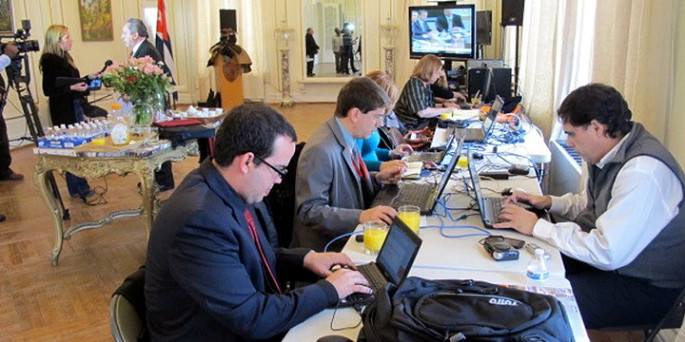
Meet the Cuban press
Powered by strong Cuban coffee served in little porcelain cups, and by more-or-less reliable American broadband and WiFi, the Cuban press corps worked out of a makeshift newsroom in the ornate reception room of the Cuban Interests Section on 16th Street NW. They were in town to cover the second round of talks Friday between the two nations to restore diplomatic relations. They were also making a little bit of media history:
The nearly dozen journalists from half a dozen television, radio, print and digital outlets represented the largest assemblage of Cuban media in the United States in decades, according to Cuban officials and the reporters themselves.
“I think that we are living a very important part of our history, and I’m very grateful to be able to witness that and tell it to my country,” said Cristina Escobar, an anchor, reporter and political commentator for Televisión Cubana. “We’ve been in a context of confrontation for so many years, not only in the political perspective but in the media perspective. So now we have to develop a new approach towards the United States – seeing the diversity of this country, the complexities, and how many different peoples and views about Cuba and the world you have. And [reporting] about even the domestic issues, and how the political system works.”
The other outlets included the newspapers Granma and Juventud Rebelde,Radio Rebelde, the Havana-based international news service La Prensa Latina, the Cuban news service Agencia de Información Nacional and the Cuban online news source CubaDebate.
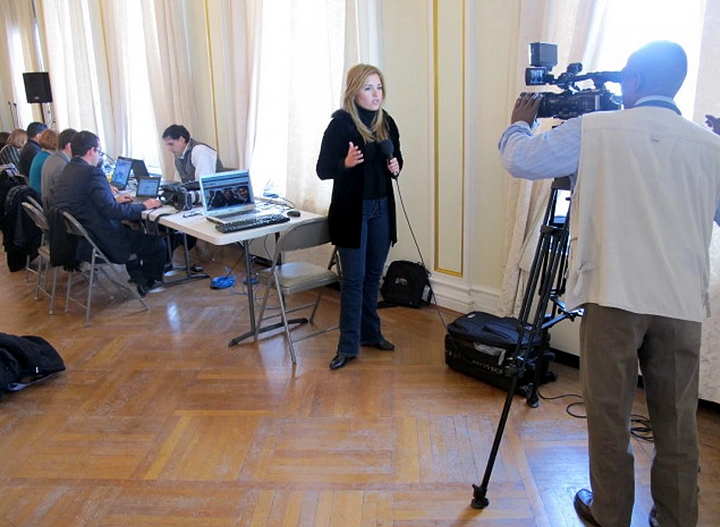
One of the only Cuban journalists based in the United States is Waldo Mendiluza, who covers the United Nations in New York for La Prensa Latina. The Cuban reporters say the expense of maintaining a news bureau and the difficulty of obtaining visas have prevented a greater Cuban media presence in this country. American officials say there’s no policy against granting visas to Cuban journalists but that they are rarely requested.
The main Cuban media outlets are owned by the Cuban government.
“In the United States, that’s understood as: I work for the state,” said Sergio Alejandro Gómez, foreign news editor for Granma, which is named after the boat Fidel Castro used to return to Cuba and launch the revolution that brought him to power in 1959. It is the official paper of the Cuban Communist Party. “I look at it as: I work for the people.”
But now independent blogs are popping up on the island as alternative sources of information, along with well-funded foreign-owned media.
“There’s a comprehension from the authorities and from us who work in the media that we aren’t the only [news] source that people have,” Escobar said. “And we don’t think we control the information. We know we don’t. We have to fight for audience.”
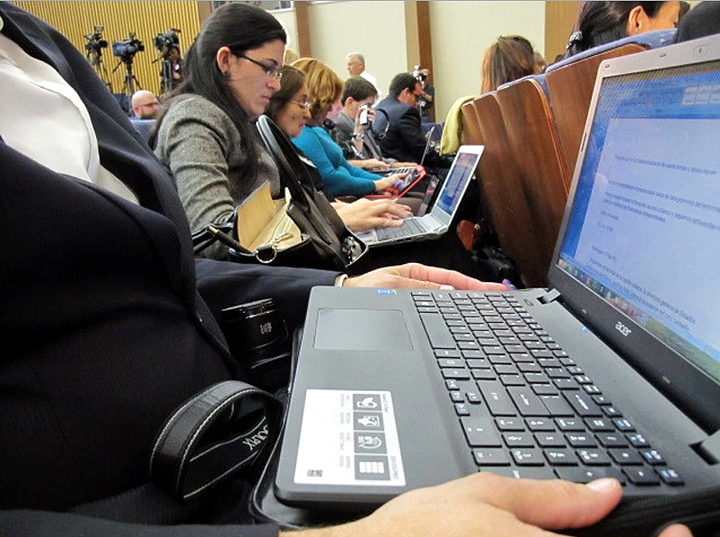
Escobar, 27, Gómez, also 27, and Jorge Legañoa Alonso, 32, a sub-director for news at the Agencia de Información Nacional, are part of a younger generation of official journalists who came of age during Cuba’s deep economic crisis in the 1990s after the collapse of the Soviet Union. They have witnessed a loosening of some economic and ideological tenets. They say they are free, and even encouraged, to criticize government institutions when those are failing at their responsibilities. The criticism is always in the spirit of seeking to improve the Cuban system, not to challenge it.
“We need public institutions to have a sense of accountability, and the press has to do a big job with that,” Escobar said. “And we’re growing into that, we’re learning to do that.”
Legañoa, whose agency supplies content for the regional media outlets of Cuba, said that two months ago Granma published his agency’s investigation of Cuban agriculture. The report criticized problems in getting products to the markets and the people.
“Readers called up and said how great that you are speaking of this,” Legañoa said.
Escobar said the president of the Cuban television and radio institute — the top media boss — called her in Washington. “He asks what am I going to do. He’s not telling me what to do. He’s just telling me, ‘Do it quickly!’ ”
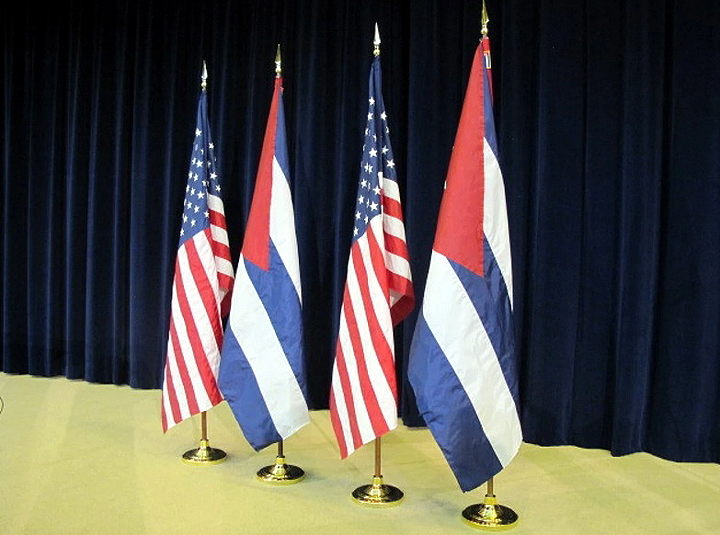
The Cuban reporters arrived in Washington late Wednesday and stayed up frolicking in the falling snow. Snow pictures filled their Facebook pages. Then they got down to work. Rosa Miriam Elizalde waxed lyrical in CubaDebate, describing “two Washingtons” — the “imperial” city, and the city of protest and hope. Later she started a “minuto a minuto” — “minute to minute” – live blog of reports on the diplomats’ meeting.
Several went into the streets for interviews with people on the attempt to open diplomatic relations. “No one had a negative word,” Legañoa said.
At the Cuban Consulate, Cuban Americans waiting on line for consular services could not believe who was trying to interview them.
“The question always is, ‘Journalists from Cuba? Really, Cuba?’ ” Legañoa said. “Everyone was happy to see the Cuban press here in Washington.”
Like many of those they interviewed, the reporters think this could be a special moment in the history of relations between the two countries, when something might actually be accomplished. They expect the process will take time.
“I’m realistic. I know that the interests are clear,” said Escobar, whose college thesis was an analysis of President Obama’s and White House officials’ statements and policies on Cuba early in Obama’s administration. “The United States is not happy with the kind of system that we have in Cuba. And the intentions of trying to change that are not ended…. I don’t think that should be a reason not to establish diplomatic relations. It should be a valuation in which we both know what we want from each other. Cuba has a lot to offer the United States, and [Cuba] needs economic relations with the United States.”
Nevertheless, she said, “we’ve demonstrated we don’t need the United States to live. We are alive. We’ve been in a socialist revolution for 55 years, with problems, but with so many successes.”
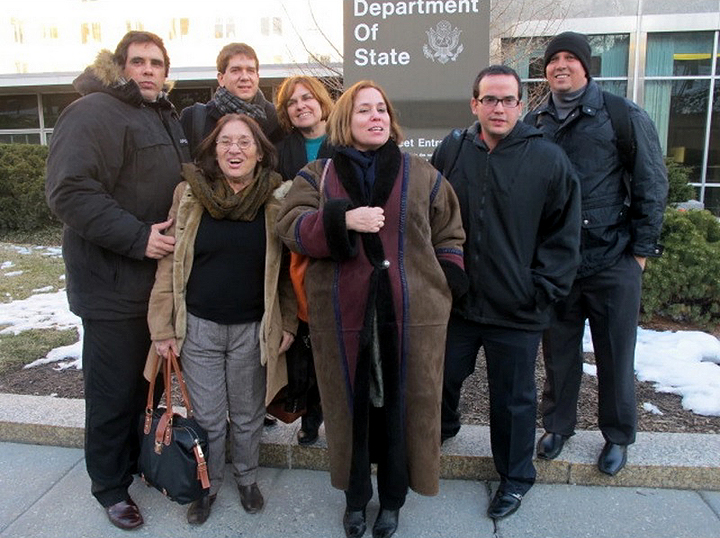
Inside the State Department briefing room Friday afternoon, the Cuban press corps filled the third row. NBC News reporter Andrea Mitchell came over to say hello. Escobar told Mitchell how much she admired her.
The Cubans had no questions for the Cuban emissary, Josefina Vidal, who spoke first. Next, Roberta Jacobson, the State Department’s top envoy to Latin America, came to the podium and echoed Vidal’s assessment that progress had been made.
Gómez, from Granma, raised his hand to ask a question. Several other reporters were called on instead. On this historic day for Cuban media in Washington, the Cubans would not get to ask a question at the formal briefing.
Later, a reporter from Reuters explained to Gómez that the custom is to let the press office know in advance that one wants to ask a question. (A State Department official said that the department seeks questions from a range of outlets and looks forward to taking questions from Cuban reporters at future encounters. Cuban media were called on at the first round of talks in Havana.)
With Gómez’s unasked question for Jacobson hanging in the air – “Has the United States accepted the legitimacy of the Cuban revolution?” – the Cuban media headed back to Havana on Saturday, unsure when, or whether, they will return.
(From: The Washington Post)

